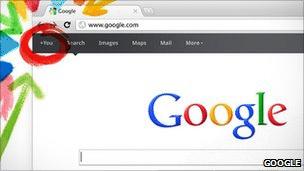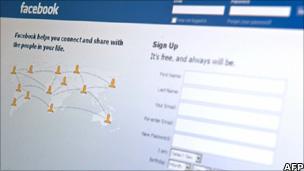Google+: The new Facebook rival?
- Published
- comments

Google+ for now has a limited release
Unlike the launch for Google Buzz, Google+, the company's most aggressive attack on Facebook's domination in the world of social networking, was unveiled with little fanfare and little fuss.
Back in early 2010 the fourth estate came out in force to hear all about Buzz, external, the search giant's big social play at the time.
Proof that the company thought so highly of this product was evidenced by the fact that Google co-founder Sergey Brin took part in the press conference.
Buzz had all the right ingredients of a socially engineered product but failed because of serious stumbles around privacy.
Earlier this year Google reached a settlement with the US Federal Trade Commission, external to resolve concerns the company violated its own privacy policies through Buzz.
This time around for Google+ which was code named Emerald Sea, there was no press conference, no big press reveal and no execs trumpeting its arrival.
The emergence of Google+ was more or less heralded with a simple blog post by Vic Gundotra, external, senior vice president of engineering at Google and the man who has been in stealth mode for over a year leading the company's social play.
New features
But make no mistake, the lack of ceremony surrounding the arrival of Google+ does not take away from the fact that this is Google's most serious and concerted effort to try to nail social.
It is also its most ambitious attempt to answer Facebook without copying what it does. To simply do that would have been a recipe for disaster.
At the core of Google+ is a feature called Circles which is aimed at making it easier to organise friends, family members and others into smaller, easier to manage and more intimate groups as opposed to everyone you know.
The product will also draw on Gmail to work out who you might like to invite into the circle.
With more than 500 million users Facebook is a growing threat to Google, its bottom line and how users will continue to search. Right now Google can lay claim to over 65% of the search market in the US according to research firm comScore, external.
But as users rely more and more on friends and their social graph for recommendations, Facebook is in the right place to cash in.
Old rivals
The reasoning goes that who would you trust for a recommendation for a hairdresser/restaurant/gym more? Your friends on Facebook or Google's search engine?

Facebook dominates the world of social networking
The fact that Google and Facebook don't play nice in the sandbox adds to the drama of the situation. Remember earlier this year that Facebook was caught using a PR firm to plant unflattering stories about Google.
Proof of the enmity between these two technology giants is clear in Mr Gundotra's blog post when he refers to social networking as being "sloppy, scary and insensitive" and maintains that the "problem is that today's online services turn friendship into fast food - wrapping everyone in 'friend' paper."
Ouch!
Remember all that information that Facebook's 500m users are sharing is locked behind Facebook's wall out of the reach of Google's spiders and search smarts.
Over the last couple of years Facebook has grown into a social networking behemoth.
In May 180 million people visited Google sites including YouTube compared to 157.2 million on Facebook, according to comScore.
When it comes to user engagement Facebook is in the clear lead.
Users looked at 103 billion pages and spent an average of 375 minutes on the site compared to Google's 46.3 billion pages where users spent 231 minutes.
These are figures that advertisers pay close attention to.
Earlier this year, Google's then CEO and now chairman Eric Schmidt admitted he "screwed up" in the area of social networking.
"I clearly knew I had to do something and I failed to do it," he said.
Since co-founder Larry Page resumed the role of CEO back in April he put the company on notice and told employees that future bonuses would be tied to the success of Google's social strategy.
In a memo that he sent out at the time, external, Mr Page said "we all have a stake in the success of this effort".
Google is playing it canny by only releasing the product via invite to a limited set of users before being gradually opened up to the general public.
That way they can react quickly to feedback and implement changes quickly without upsetting a lot of users.
Analysts are divided about how successful Google+ will be but Charlene Li of the Altimeter Group said Facebook has to be worried nonetheless.
"The biggest risk group inside Facebook are people like me who are marginal users, in their 40's and someone who does not have all their friends on Facebook. Facebook is a toss up for me. My entire social graph isn't using Facebook so that is up for grabs and if Google+ does a good job for people like me, that is where I will go.
"It will be an interesting battle ahead. And for Google to be successful it doesn't have to beat Facebook, it just needs to get enough people in these circles to spend time there to make a dent on what Facebook does."
The ironic thing about the timing of the launch Google+ is that is enters stage left as a former darling of the social networking world watches the curtain slowly come down on its present.
Later today it is expected that MySpace will announce a number of lay offs, external along with the news that it will be sold for around $30m, a far cry from the $580m that Rupert Murdoch paid in 2005, external for what was then the world's biggest social network.
For now that title belongs to Facebook.